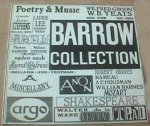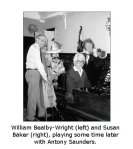(1963) The Barrow Poets – The Barrow Collection
The Barrow Poets – The Barrow Collection – An entertainment of Poetry and Music
 Issued in: 1963
Issued in: 1963
Argo issue number: RG360
Sleeve notes: H.J.U. (presumably Argo founder Harvey Usill)
Line-up:
William Bealby-Wright – voice
Gerard Benson – voice
Heather Black – voice
John Boulton Smith – voice
William Gardener – voice
Alison Milne – voice
John Naylor – voice
Christine Shotton – voice
Susan Baker – violin
Lorna Gregson – oboe
Tracks
Side 1
Ploughing on Sunday (Wallace Stevens)
(music) Pigtown Reel (American traditional)
Oh see how thick the Goldcup flowers (A.E.Housman)
Tru to Poll (Sir Francis Bernand)
Ach, I dunno (Percy French)
Kind are her Answers (Thomas Campion)
Slice of Wedding Cake (Robert Graves)
Nora Criona (James Stephens)
(music) Irish jig (traditional)
Off the Ground (Walter de la Mare)
(music) Evening Prayer (traditional)
Helen of Kirkconnell (Anon)
John Kinsella’s Lament for Mrs. Mary Moore (W. B. Yeats)
Po’ Boy (Anon)
(music) Spinning song (traditional)
Request (J. Hughes)
How they Brought the Good News from Aix to Ghent (Sellars & Yeatman)
Side 2
Wha’ Lies Here? (Anon)
104th Chorus (Jack Kerouac)
The Frog (Anon – French Canadian)
(music) Ländler (Mozart)
Blow Me Eyes! (Wallace Irwin)
Lines from “Betsy Lee” (T.E.Brown)
When I Was One and Twenty (A. E. Housman)
Linden Lea (Barnes)
(music) Fair are the flowers in the valley (traditional)
Extract from the Song of Solomon (Authorized Version)
Day of these Days (Laurie Lee)
Dirge of Cymbeline (Shakespeare)
(music) Air (Purcell)
Lessons of War, Part II: Judging Distances (Henry Reed)
Kissed Yestreen (Anon)
Extract from ‘Don Juan’ (Byron)
(music) Allegro (Mozart)
I Do, I Will, I Have (Ogden Nash)
Northumbrian Duet (Wilfred Gibson)
Notes
The Barrow Poets started out selling poems from barrows in the late 1950s, then moved into performing in pubs.
This, their first record, was recorded at the home of Manx poet William Bealby-Wright and violinist Susan Baker.
“We (they) fixed up mikes and egg-boxes and recorded a number of poems and pieces of music,” Gerard Benson recalls. “Harley (Usill of Argo records) had told us that if the result was of professional standard it might be released on Argo. It was.”
“At the time we were doing pub performances under Plays and Poetry in Pubs, a brewers’ funded outfit which I think had some connection with the Arts Council. We advertised and performed in saloon bars.”
Sales of The Barrow Poets’ records were never high, says Benson. “We sold them at gigs and they were in some shops. But the records got us lots of work elsewhere. We were at our best as a live performing group.”
“Round about this time we got too popular and started to mount performances separate from the saloon bar drinkers, particularly at The Printer’s Devil in Fetter Lane. They were very popular. We filled a large room sometimes to overflowing, with people standing on the stairs.”
The pleasure of the general public
Entertainment is the intention of this record, say the liner notes.
“The intention is obviously a splendid one,” said a rather snooty contemporary review of the album by Charles Fox in the Gramophone, “and presumably experience has shown that the kind of material included here appeals to the drinking public. Whether it stands up to listening in the comparative solitariness of the home is quite another matter.”
A reader of the magazine wrote in to complain of the reviewer’s “condescending views”.
“With all due respect for C.F. this is a lot of rubbish. It’s about time poetry records were designed for the pleasure of the general public. That’s where poetry belongs – not to ‘mystic’ groups and classrooms. Lets have some of the works of Wordsworth and Browning with musical intermissions.”
Here, for the pleasure of the general public, is some fine poetry – a bit of everything, old and new, some Shakespeare, some Kerouac, some Byron, some Laurie Lee, plus Walter de la Mare’s farmers going “Withy, Wellover, Wassop, Wo. Like an old clock their heels did go.”
But is it a folk record?
No. But it’s an example of what performers were doing with folk music at the time – in this case using traditional folk tunes to break up some of the segments of spoken word. Later, after composer and instrumentalist Jim Parker joined the Barrows, “the music got more complicated and interesting,” says Gerard Benson. And folkier.
“The folk content was just a part of it,” says Benson. “We mostly did composed poetry and music. Part of the motivation for the (later) folk record was copyright. We all liked some of the folk stuff, but none of us was particularly a buff.”
Zany
“Go into a pub and hear a poet. Go into a pub and hear the music of the Cacofiddle and the Muscle-in, grotesque home-made contraptions that might have been designed for an angel by Hieronymous Bosch. Go into a pub and hear a new, zany approach to a poetry session. The Barrow Poets, a roving group of poetry lovers as offbeat as the Beatles were when they first started life in a Liverpool cellar, are Britain’s increasingly popular fun entertainers.”
I haven’t found a review of The Barrow Poets at the time this album came out, but the paragraph above is how the London Evening Independent described them in November 1968, a month before the ‘zany’ Liverpool poets and performance artists The Scaffold went to number One in the Charts with Lily The Pink.
Barrow Records
The Barrow Poets’ second record was an EP, issued on their own label as Barrow Records 1. “There wasn’t a Barrow Records 2,” says Benson. From there they went to other labels – “we signed up where we could and where we were wanted” – before returning to Argo for two more albums in the 70s), more of which anon.
Poems on the Underground
In the 1980s, Barrow poets Gerard Benson and Cicely Herbert (she joined later) and US academic Judith Chernaik dreamed up the idea of displaying poetry in the unsold ad spaces on the London Tube. They, and Poems on the Underground, are still with us.
 Where are they now?
Where are they now?
The Barrow Poets’ last live performance was in 2001 or 2002 – 40 years of performing in pubs, arts festivals, pop concerts (indoors and out), village halls, mansions, cathedrals, hospitals, inner city schools and universities. William and Susan Bealby-Wright (Baker) are still active musically, organising concerts in Somerset. Gerard Benson continues to publish his poetry (including some lovely books for children). More of the other Barrow Poets in later posts.
Many thanks to Gerard Benson for his help, and to the Erin Arts Centre, Isle of Man, for the photo of the Bealby-Wrights.
Argo & Poetry
In the ‘fifties and ‘sixties the Argo label led the way in the UK with spoken word LPs, including poetry. That was largely down to the personal enthusiasm of label founder Harvey Usill. Their biggest early success was the 1954 BBC recording of Under Milk Wood, starring Richard Burton, which over the years is said to have sold over two million copies in one format or another since its initial release.
Other albums released that year
Louis Killen, Bob Davenport, Anne Briggs, A.L. Lloyd, Ray Fisher et al – The Iron Muse
The Beatles – Please Please Me
Bob Dylan – Freewheelin’
Phil Spector – A Christmas Gift For You
Solomon Burke – If You Need Me
Davy Graham – The Guitar Player
Del Shannon – Little Town Flirt
The Watson Family – The Watson Family
~ by folkcatalogue on May 3, 2009.
Posted in Uncategorized
Tags: argo, barrow poets, deleted, discography, folk, gerard benson, poems on the underground, poetry in pubs, usill, vinyl



Hi – I remember seeing the Barrow Poets perform live at Solihull civic hall late 60’s – they did a song which I think was called the telephone exchange (bladder to brain, bladder to brain, this is your early morning time call……….etc) is this the right title and does anyone know how I can get hold of it?
[…] off this week with The barrow poets and their delightful ‘yellowfingered Girl’, We listen to a classic recipe in the old […]
The one that starts with a Yellow Fingered Girl | Isotopica: a culture feed said this on September 21, 2012 at 12:46 am |
I remember an evening circa 1970 when I stood on the stairs at a crowded venue near St Pauls Cathedral. Have never forgotten the poetry but can’t recall songs though some home-made version of a harp accompanied words. Always regretted not buying their book. Economies of the day spoil future memories! Decided to try internet and here I am.
Dear Sir/Madam,
having seen your imformation about the LP, as a founder member of the Barrow Poets, I would like to correct the imformation that you have provided so far and would be most grateful if you could edit it according to my imformation as follows:
I must correct what has been published about The Barrow Poets’ history and
> its founders. It all started at the 1951 Festival of London, centred on the South Bank.
> We were recent graduates of University College London, namely: Adrian Rowe-Evans,
> John Boulton-Smith, and myself, David Grant. We soon included Patrick Wymark,
> who was a leading light of the College DramSoc. and later became a popular stage
> and film character actor. John Smith brought along the violinist, Susan Baker.
> The South Bank was so full of traders’ barrows that even if we had enough original
> poetry to stock one, we would never be able to sell it. At length the Brewers’
> Federation invited us to perform (not recite) our poems at their pubs, associating
> with the Shakespearian actors (the Taverners) who performed in upstairs rooms.
> The Brewers also provided a circuit of accessible London pubs, and posters to announce
> our half-hour of performance poetry.
> We were later joined by Alison Milne. Heather Black, Williams Gardner and Bealby-Wright.
> I gave a lecture at the Octagon, Bath, explaining how we chose poems as “pubbable”,
> performed every other Friday night and, on the interim Friday, rehearsed and reviewed poems.
> In 1960, my teaching job took me out of London, and so, reluctantly, I resigned as a “Barrows”.
> Not long afterwards I heard that my erstwhile colleagues had performed in the USA at the
> Carnegie Hall, New York, and the Hollywood Bowl!
> Pleased and relieved to bring you up to date. By the way, I’m now 89 years old.
> David Grant, sole surviving original Barrow Poet.
I saw them a few times in the 70s including at the King’s head Islington. They were great. Particular highlights includ their rendition of ‘in our street ‘(love is a kind of malady ) and ‘Daffodils ‘ – fine performances,fondly remembered.